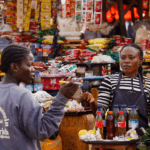
Professor Peter Quartey, Director of the Institute of Statistical, Social and Economic Research (ISSER)
Only 22% of households in Ghana used clean fuels in 2022, despite national policies and frameworks
Similarly, 18.5% of richest households in Ghana use clean fuels, compared to only 0.1% of poorest households.
According to a report by the Institute for Statistical, Social and Economic Research (ISSER, a higher educational attainment correlates positively with clean fuel adoption.
In 2008, 13.6% of the population used clean fuel. The number has subsequently shot up to 28.7%. The number shot up to 28.7% in 2022.
In the urban center, 42% of Ghanaians used clean energy compared to 11.2% in the rural areas.
Importantly, southern urbanized areas (Greater Accra, Ashanti) lead in clean fuel adoption, while northern regions lag considerably due to socio-economic and infrastructural divides
The report pointed out that rural households (88.8% using dirty fuels) face increased risk of respiratory diseases, cardiovascular conditions, and adverse birth outcomes.
In terms environmental implications, it said continued reliance on wood and charcoal contributes to deforestation and greenhouse gas emissions.
Approximately 2.6 billion people worldwide still rely on polluting cooking fuels (biomass, coal, kerosene.
DISCLAIMER: The Views, Comments, Opinions, Contributions and Statements made by Readers and Contributors on this platform do not necessarily represent the views or policy of Multimedia Group Limited.
DISCLAIMER: The Views, Comments, Opinions, Contributions and Statements made by Readers and Contributors on this platform do not necessarily represent the views or policy of Multimedia Group Limited.
- President Commissions 36.5 Million Dollars Hospital In The Tain District
- You Will Not Go Free For Killing An Hard Working MP – Akufo-Addo To MP’s Killer
- I Will Lead You To Victory – Ato Forson Assures NDC Supporters
Visit Our Social Media for More




